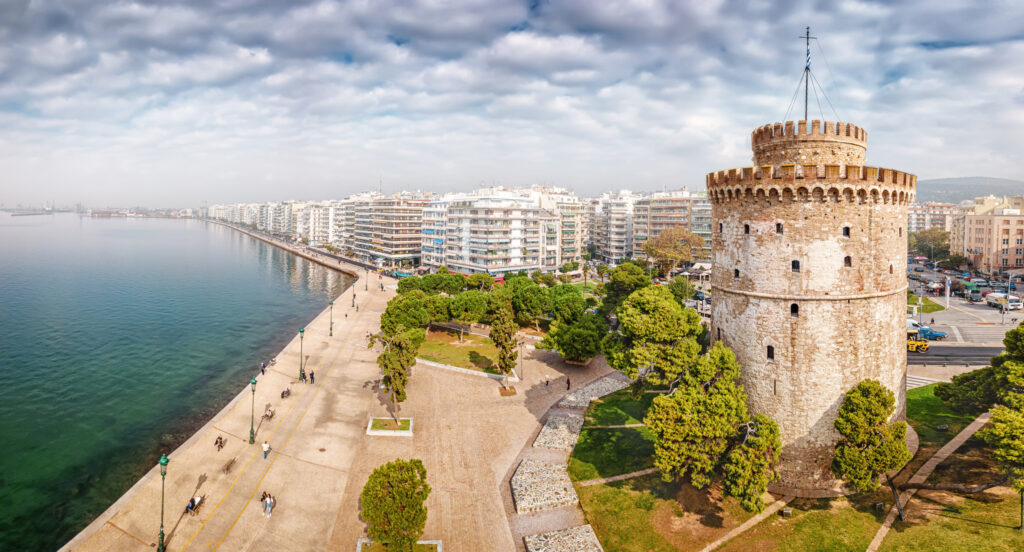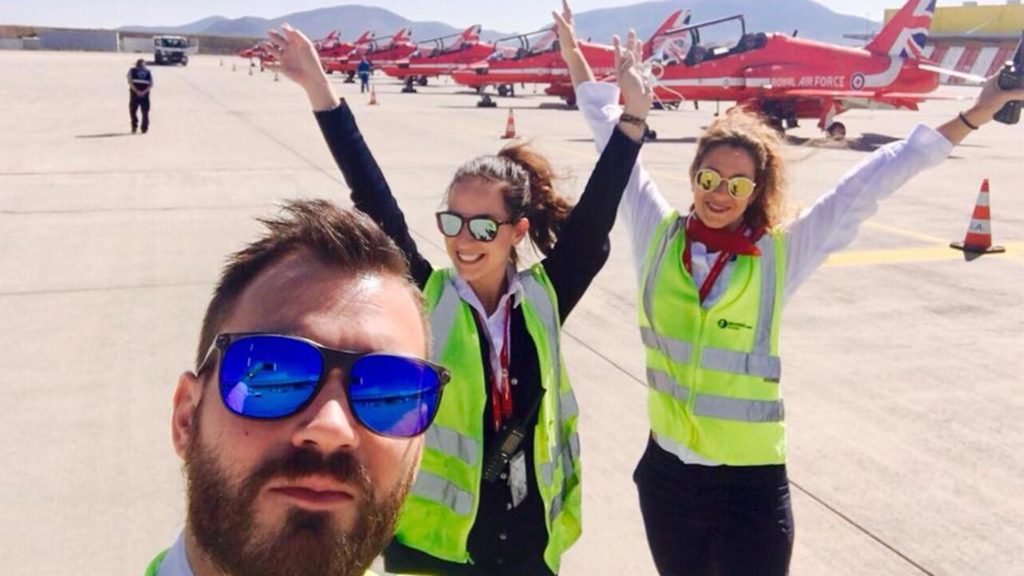Greece: 2025 Business Aviation Destination Guide

For more detailed information on specific destinations and regulations within Greece, please visit our articles on:
Popular island destinations, exclusive summer resorts, and an upward trend in tourism have made Greece an even more in-demand tourism/business destination in recent years. There are many popular Greek destinations, for operators planning general aviation movements, to consider for Greece. The good news is that operating to and within Greece is not onerous – from a planning or day-of-operation perspective. However, it is crucial to be as flexible as possible as you need to be aware that aircraft parking may be limited or unavailable at specific locations during the peak season, and slots at popular destinations might be limited during busy hours. Here’s everything you need to know about operating to Greece.

Permits
Landing permits are not required for most private non-revenue operations to Greece unless you’re landing at a joint-use civil/military airport. At most airports, locally-issued PPR and slots are needed for landings. However, as per European Union regulations, landing and overflight permits are required if you’re a Stage 2 flight, flying on an experimental certificate, or operating with temporary documents.
Charter Permits
Civil Aviation Authority (CAA) of Greece requires a landing permit for non-European Union (EU) registered aircraft (non-scheduled commercial) operators traveling to the country.
Note: EU-registered aircraft do not need this permit. Charter aircraft with or less than 19 passenger seats can obtain an annual permit. In contrast, aircraft with more than 19 passenger seats will need to obtain one for each flight. The lead time is a minimum of five working days, and documentation such as the company operating license, airworthiness and registration, and the security program approval must be furnished.
Useful tip! EU insurance limits are different than in the USA. Make sure that your insurance certs are issued according to EC785/2004. It’s recommended that you work with your trip support provider to obtain landing permit(s) for travel to Greece. However, this permit allows you to operate international flights only. Within Greece, commercial ops to non-EU operators are not allowed. Only tech/positioning flights can be operated. UK commercial operators are also subject to this permit since Brexit came into force on January 1st, 2021. According to the trade agreement between EU-UK, certain freedom rights are granted, which means charter flights are permitted only between UK or EU -Greece- UK or EU. UK charter operators are not approved to operate from third countries to Greece.
Note: ferry flights and tech stops are allowed regardless of the destination/origin.
Private vs. charter requirements
Procedures are precisely the same for private non-revenue and charter (non-scheduled commercial) PPRs. In the case of Athens (LGAV) summer 2024 parking was allowed for a max stay of 08 hours, implemented strictly with very few exemptions to aircraft carrying passengers on both legs inbound/outbound with a stay not exceeding one overnight, always subject to availability and a/c type.
Note: Starting March 2025, LGAV will become slot coordinated. Runway movements and parking will be approved through the Hellenic Slot Coordination Agency, which is expected to reduce parking availability even further. Slot coordination procedure is a strict and inflexible procedure, not allowing space for exemptions and flexibility. For joint-use civil/military airports, such as Preveza (LGPZ), private operations need an additional permit with four business days prior notice.
Cabotage
Note that Hellenic Civil Aviation Authority (CAA) procedures mandate that passengers on private flights sign a declaration that the flight is private and no fare has been paid. This is a required procedure before departure. If it’s not done, your gen dec will not be stamped, and passengers will not be permitted to proceed to the aircraft.
Customs
The Customs, Immigration, and Quarantine (CIQ) experience in Greece is relatively quick, professional, and user-friendly. However, if you’re arriving from outside the European Union (EU), it’s essential to confirm you have all documentation and required visas in order before arrival.
Other than at LGAV, where you’ll clear customs, immigration, quarantine (CIQ) quickly within the general aviation terminal (GAT) expect to clear CIQ in the main terminal along with scheduled commercial passengers. Priority clearance may be possible to arrange, at CIQ’s discretion, to allow you to clear at a separate counter in the main clearance hall.
At Mykonos (LGMK), Corfu (LGKR) and Kos (LGKO) only, there is a small separate lounge appointed to GA/BA traffic only. Security, customs, and immigration are available at this area, the use of which is expensive but mandatory for all general aviation or business aviation flights, private or non-scheduled commercial.
The lounge in Mykonos became available in July 2022, in Corfu July 2023 and in Kos May 2024 providing privacy and improving passengers’ handling experience but also adding a significant cost to the flight expenses as a flat fee of 2000 euros (+ VAT when applicable) per live leg was charged for its use.
Your ground handler will transport crew members/passengers and luggage to clear at the appointed facility, GAT, or Main Terminal for international arrivals from outside the EU. This usually takes only a few minutes.
CIQ is not required for arrivals from within the EU unless customs or border police decide to do a random check.
For departure to non-EU destinations, CIQ clearance is necessary. For intra-EU departures, the only requirement is to show a passport or other passenger identification document to airport police. However, on departure, all luggage is X-rayed and all individuals are screened. At airports other than LGAV, LGMK and LGKR, both CIQ and security screening are done in the main terminal.
In this case, CIQ will need to confirm IDs for every arriving/departing crew member/passenger. Your ground handler will arrange when allowed for expedited crew/passenger clearance – either through a separate line or with priority over scheduled commercial passengers in a regular clearance line.
Crew/passengers go through security screening for all departures regardless of destination.
CIQ clearance cannot be done onboard an aircraft in Greece – only at LGAV’s, LGMK’s, LGKR’s and LGKO’s GAT or via main terminals at other locations.
No CIQ fees are applicable at LGAV, Thessaloniki (LGTS), or Iraklion (LGIR). Still, there may be fees involved at some airports where CIQ is available only with prior notice.
CIQ requires the presentation of a general declaration which your ground handler can arrange in advance.
No arrival/departure cards are required in Greece.
Documentation requirements & Visas
A valid passport is required for all non-European Union (EU) nationals. In addition, EU nationals should always carry a national ID, passport or driving license. Depending upon nationality, visas may be required.
Note that visas cannot be obtained upon arrival, and those without required visas face fines and/or deportation. If passengers require Schengen visas, such visas must be obtained before arrival. If a visa is not required, passports will need to be valid for the intended length of stay in Greece unless immigration laws state otherwise.
Crew members may enter the country with valid International Air Transport Association crew IDs for a max stay of 72h. Alternatively, a valid passport – and a visa in some instances – will be required.
Agricultural considerations
At this time, there are no agricultural restrictions to note – in terms of bringing catering into the country – but always confirm requirements with your ground handler.
Pets

Bringing your pet to Greece is generally a more straightforward proposition than many other international destinations. First, however, it’s vital to ensure the pet has a valid health certificate and has been either microchipped or tattooed. Pets are permitted into Greece with a pet passport, microchip, and a valid vet health certificate.
Weapons
Bringing hunting weapons into Greece requires licensing, proper documentation, and advance notification to make needed arrangements.
Flight planning
Flight planning procedures and requirements for Greece follow the Eurocontrol policies, and, for business aircraft operators, these procedures are straightforward. However, it’s usually best to have your ground handler assist with flight plan filing in Greece. They can monitor any flight planning issues that may come up and make on-the-spot revisions, when necessary, to avoid operator delays. All Instrument Flight Rules (IFR) flight plans for Greece are filed and controlled via Eurocontrol’s Network Manager Operations Centre. Last-minute flight plan changes may be done via Eurocontrol while you’re on the ground. Eurocontrol will also be able to assist with route changes while you’re airborne. At Athens (LGAV), Air Traffic Control (ATC) will provide directions on where to land and taxi. At other Greek airports, ATC will provide your parking position. There are also cases where ATC may not be able to assist you with arrival details during high season. You’ll need to use the follow-me cart to guide you to parking position, and you will be parked by a marshaller.
GA/BA Flight Plan Suspension Procedure procedure
For the purposes of the present procedure, the definition of an allocated and confirmed airport slot for General/Business Aviation and Air Taxi flights is the time for which the airport slot is confirmed by the Hellenic Slot Coordination Authority (HSCA), including a tolerance +/- 15 minutes. Slot ID must be included at item 18 of the FPL in an ASL format. Eurocontrol monitors flights operating into/out of Greece, matching approved slots against filled FPLs, suspending the ones not having a valid slot or filled beyond the 15-minute tolerance. Flights arriving from airports outside of Eurocontrol’s area of operation cannot be affected/suspended, but operators need to bear in mind that operating out of your approved slot or without a slot may lead to heavy fines. In the previous years, Eurocontrol would call the operator or the handler, to advise of the upcoming suspension offering the possibility to make an adjustment and avoid it but, starting in 2024, this was not be the case any longer due to the heavy workload making it impossible to contact each and every operator.
In the past summer seasons, a pattern has been observed: some operators turned their FPLs into VFR, Y, or Z in an effort to exclude themselves from FPL suspension procedures. This does move them out of Eurocontrol’s monitoring procedures but does not change the fact that slot violation exists and the flight may be subject to heavy fines.
Aircraft Equipment Requirements
Aircraft operating in this region need to be equipped for area navigation (RNAV) and required navigation performance (RNP) 5 when conducting flights on air traffic service routes. In addition, VHF radio 8.33 channel spacing is mandatory for all IFR flights in the European Union region. You’ll require a Mode C transponder, Airborne Collision Avoidance System (ACAS) II, and Emergency Locator Transmitter (ELT).
Day-of-operation procedures
Your ground handler will verify and confirm all required pre-departure services, confirm that flight plans are filed, and ensure there are no restrictions – such as airway slot delays , CTOT– that may impact your flight plan. Ground handlers can assist if crews have flight plans to file; alternatively, crew members may submit flight plans at the airport tower. Another filing option – if crews have the International Civil Aviation Organization flight plan information ready – is for the ground handler to forward this to Eurocontrol via SITA. It’s important to remember that all IFR flight plans need to be filed via Eurocontrol. On the other hand, Visual Flight Rules (VFR) flight plans are filed via an aeronautical fixed telecommunication network at the nearest tower. Note that there are VFR lower-level restrictions over many historical sites in Greece – including the Acropolis in Athens.
Some airports have no towers
There are several smaller airports in Greece that do not have ATC towers. These airports are typically controlled by the surrounding airport.
Pushback requirements in Greece
Most a/ps now have turned their ramps into nose-in parking spots only to increase ramp space. It’s mandatory for operators of Cat B aircraft and above to carry their tow bar and head onboard and offload it for using it if the equipment is not available by one of the local ground handlers. Tow bars for a few popular GA aircraft types are available in Athens, Mykonos, Santorini, Corfu, Thessaloniki and a few other popular airports. You are urged to include tow/bar head availability info when submitting your handling request so as to expedite PPR submission.
Tech stops
Tech stops in Greece are generally quick experiences – usually around 30 minutes. However, suppose the tech stop is your first entry to / exit from the European Union (EU). In that case, you’ll need to clear CIQ – about a three-minute process per passenger. Onboard CIQ clearance may be requested but -since it’s not the typical procedure- will be at the discretion of the customs officer on duty. The best place for an international tech stop is LGAV. Even though it’s turning into slot coordinated this summer, slots for a quick turn are not so limited, traffic congestion is manageable, fuel services are 24/7, and efficient, quick turns. Other tech stops to consider include LGTS and LGIR, both 24-hour airports of entry AOE with sufficient infrastructure and services to facilitate quick turn fuel uplifts.

Thessaloniki
Peak season/high-traffic events

June through September is always peak season for Greece, creating congestion. As a result, airports throughout the country – both mainland and islands – are inundated with traffic from all over the world. Due to the congestion, authorities are implementing restrictions to accommodate the influx, affecting general aviation (GA). Our Greek Islands Business Aviation Destination Guide article has more on operating to Greece during peak season.
Cultural considerations

Greece is known for its friendly people and amazing and vibrant culture. Security and/or safety concerns for those visiting Greece are no different from such issues in other European countries. It’s always best to practice basic security awareness. Certain small areas of Athens (LGAV) and Thessaloniki (LGTS) should be avoided due to petty crime.
Greece has been a popular tourist destination for decades. Its people are happy to welcome thousands of tourists each year. English is widely spoken by most people, but a large percentage of its population is also fluent in French, Spanish, German, Italian, etc.
Therefore, it’s rare to face issues in communication, even on the smallest of its islands. Depending on your destination and mood, you can easily find wonderful spots to spend your time in Greece, only in beachwear and flip flops or dressed up, dining in elegant restaurants, and attending popular events. You can enjoy your lunch in a small tavern next to the sea, having fresh fish, seafood, and fresh juicy Greek salads along with some ouzo or you can enjoy modern cuisines from all over the world escorted by famous Greek wines, like some Santorini labels, in stylish, expensive restaurants with a fantastic view, overlooking cliffs and the deep blue sea.
Athens Acropolis and its museum are certainly not to be missed if you have the chance, but Greece has so many ancient monuments spread on its land. So for those who take pleasure in such excursions, there is always the opportunity to visit one. Actually, next to Mykonos, there is a small island, Delos Island, a historical monument, well preserved, not inhabited, and available only for a visit during the daytime.
Universal Aviation Greece can help

Universal Aviation has had a presence in Greece for more than 30 years. Our primary locations are in Athens and Mykonos, and Paros. We also provide on-airport supervision at destinations across Greece and all the Greek Islands. More information and team contact info are available on our website.




